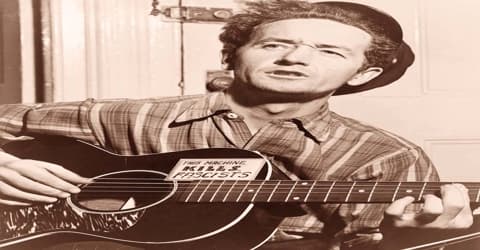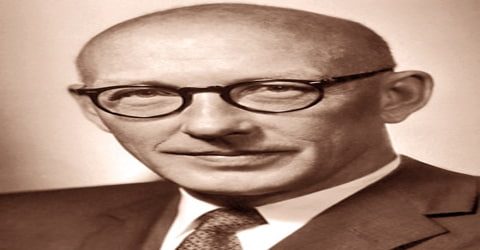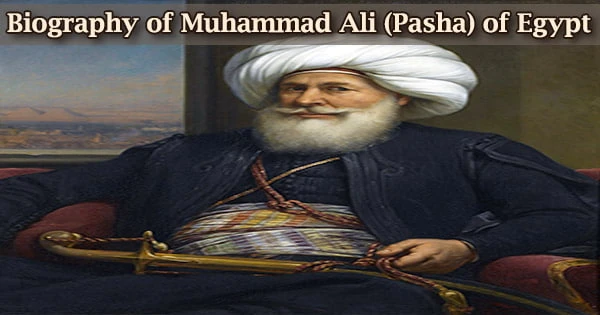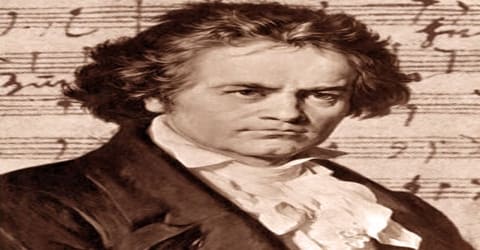Biography of Woody Guthrie
Woody Guthrie – American singer and songwriter.
Name: Woodrow Wilson Guthrie
Date of Birth: July 14, 1912
Place of Birth: Okemah, Oklahoma, United States
Date of Death: October 3, 1967 (aged 55)
Place of Death: New York City, New York, United States
Occupation: Singer-Songwriter
Father: Charley Guthrie
Mother: Nora Belle Tanner
Spouse/Ex: Mary Guthrie (m. 1933–1943), Marjorie Guthrie (m. 1945–1953), Anneke van Kirk (m. 1953–1954)
Children: Arlo Guthrie, Nora Guthrie, Joady Guthrie, Cathy Guthrie, Lorinna Lynn Guthrie, Gwen Guthrie, Sue Guthrie, Bill Guthrie
Early Life
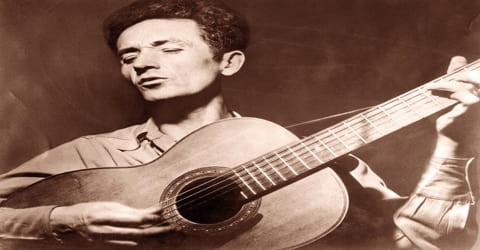
American folksinger and songwriter, Woody Guthrie was born 14 July 1912 in Okemah, a small town in Okfuskee County, Oklahoma, the son of Nora Belle (née Sherman) and Charles Edward Guthrie. He composed “This Land Is Your Land,” a song many call an unofficial national anthem. His music, which celebrates the good in people, includes messages of unity and brotherly love and remains the anthem of the poor and broken. He wrote hundreds of political, folk, and children’s songs, along with ballads and improvised works. His album of songs about the Dust Bowl period, Dust Bowl Ballads, is included on Mojo magazine’s list of 100 Records That Changed The World. Many of his recorded songs are archived in the Library of Congress. Songwriters such as Bob Dylan, Phil Ochs, Johnny Cash, Bruce Springsteen, Robert Hunter, Harry Chapin, John Mellencamp, Pete Seeger, Andy Irvine, Joe Strummer, Billy Bragg, Jerry Garcia, Jay Farrar, Bob Weir, Jeff Tweedy, Bob Childers, Sammy Walker, Tom Paxton, AJJ, Brian Fallon, and Sixto Rodríguez have acknowledged Guthrie as a major influence. He frequently performed with the slogan “This machine kills fascists” displayed on his guitar.
Even though born into a prosperous household, he had a troubled childhood as his mother suffered from a severe neurological disorder and had to be institutionalized. He also experienced difficult times during the Dust Bowl era, a period characterized by severe dust storms in America during the Great Depression the pains of which were often reflected in his songs. He traveled with migrant workers and learned their traditional songs during this period. Later on, he became a radio performer and achieved considerable fame for his hillbilly and traditional folk music. He became highly critical of the patriotic song, ‘God Bless America’ and decided to improvise on it. Thus was born his most famous creation, ‘This Land Is Your Land’ which went on to become one of U.S.’s most popular folk songs. Woody personified the heart of America as his songs resonated with the sentiments of the American working class. A prolific writer, he also wrote poems and prose in addition to songs, most of which were never published.
Throughout his life, Guthrie was associated with United States Communist groups, although he did not appear to be a member of any. With the outbreak of World War II and the non-aggression pact the Soviet Union had signed with Germany in 1939, the owners of KFVD radio were not comfortable with Guthrie’s Communist sympathies. He left the station, ending up in New York where he wrote and recorded his 1940 album Dust Bowl Ballads, based on his experiences during the 1930s, which earned him the nickname the “Dust Bowl Troubadour”.
Childhood, Family and Educational Life
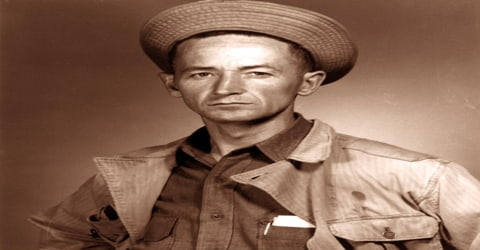
Woody Guthrie, by name of Woodrow Wilson Guthrie, was born on July 14, 1912, in Okemah, Oklahoma, the third of Charles and Nora Guthrie’s five children. His father was a businessman who was active in politics too. His parents named him after Woodrow Wilson, then Governor of New Jersey and the Democratic candidate who was elected as President of the United States in fall 1912.
The family lived near the relocated Creek nation in Okemah, Oklahoma, a small agricultural and railroad town that boomed in the 1920s when oil was discovered in the area. The effect on the town and its people of the decline that followed the boom sensitized the young Guthrie to others’ suffering, which he had also experienced firsthand through the calamities that befell his splintering family.
Woody experienced several fire accidents as a child. It was, however, never determined if the fires were accidental or set by his mother who was suffering from Huntington’s disease. His mother was sent to Oklahoma Hospital for the Insane because of her neurological disorder when Woody was 14. His father lost all of his businesses as the country struggled with the Stock Market Crash (October 29, 1929; a day when investors sold over sixteen million shares of stocks because they feared the possible effects of a recently signed tax bill many people lost everything, suicides were common, banks failed, and stores closed).
Woody was naturally inclined towards music and would play songs around town for a sandwich. He was an intelligent kid and an avid reader though he dropped out of high school before graduation. He decided to pursue a career in music and learned traditional and folk ballads. He polished his musical skills by performing at dances with his uncle who was a fiddle player.
Personal Life
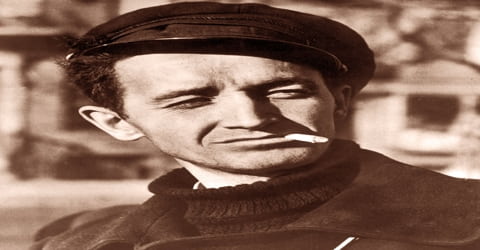
At age 19, Woody Guthrie met and married his first wife, Mary Jennings, in Texas in 1931. They had three children together: Gwendolyn, Sue, and Bill. Bill died at age 23 of an automobile accident. Each daughter died of Huntington’s disease at the age of 41, in the 1970s.
Woody later married Marjorie and had four children with her. He was diagnosed with Huntington’s disease and his wife divorced him fearing that he would be a threat to their children. He wed again to Anneke Van Kirk. They had one daughter. Anneke could not bear the strain of caring for him as his disease progressed and divorced him. His second wife Marjorie returned to care for him till his death. His son, Arlo, was also a famous musician.
Career and Works
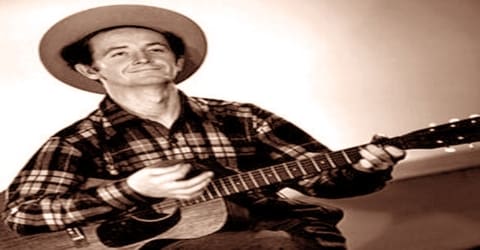
During the late 1930s, Woody Guthrie became a radio performer. He became quite popular for his folk music along with his radio partner Lefty Lou. During this time he also began writing and performing protest songs.
In Texas, Woody was given his first and only guitar. With a few chords under his belt, he began writing songs, some to old tunes and some to new ones. In Los Angeles in 1937, Woody landed a spot performing on the radio, first with his cousin, Jack Guthrie, then with Maxine Crissman, who called herself Lefty Lou. At that time Guthrie began songwriting in earnest, giving voice to the struggles of the dispossessed and downtrodden while celebrating their indomitable spirit in songs such as “Do Re Mi,” “Pretty Boy Floyd,” and“Dust Bowl Refugee.”
In 1940 he arrived in New York City and was discovered by Alan Lomax, assistant director of the Archive of Folk Songs of the Library of Congress. Lomax recorded many of Guthrie’s songs for the library. He also promoted Guthrie’s career in other ways, such as by getting Victor Records to produce a two album, twelve record set of Guthrie’s “Dust Bowl Ballads.” (A ballad is a song that tells a story.) Though they did not sell, the ballads were to have a lasting influence.
Woody Guthrie wrote a column for the Communist newspaper, People’s World. The column, titled “Woody Sez”, appeared a total of 174 times from May 1939 to January 1940. “Woody Sez” was not explicitly political but was about current events as observed by Guthrie. He wrote the columns in an exaggerated hillbilly dialect and usually included a small comic. These columns were published posthumously as a collection after Guthrie’s death. Steve Earle said of Guthrie, “I don’t think of Woody Guthrie as a political writer. He was a writer who lived in very political times.” With the outbreak of World War II and publicity about the non-aggression pact the Soviet Union had signed with Germany in 1939, the owners of KFVD radio did not want its staff “spinning apologia” for the Soviet Union. It fired both Robbin and Guthrie. Without the daily radio show, Guthrie’s employment chances declined, and he returned with his family to Pampa, Texas. Although Mary was happy to return to Texas, Guthrie preferred to accept Will Geer’s invitation to New York City and headed east.
Woody moved to New York and wrote the song ‘This Land Is Your Land’ in February 1940. The song became very famous and is counted among America’s best-loved folk songs. His first commercial album ‘Dust Bowl Ballads’ was released in 1940. The lyrics of the songs had elements of social activism and dealt with the hardships faced by migrant workers in California. He adapted the melody from an old gospel song, “Oh My Loving Brother”, which had been adopted by the country group the Carter Family for their song “When The World’s On Fire”.
During his heyday, in the 1940s, Woody was a major-label recording artist, a published author, and a nationally broadcast radio personality. But the impression this creates, that he was a multi-media star, is belied by his personality and his politics. Restlessly creative and prolific, he wrote, drew, sang, and played constantly, but his restlessness also expressed itself in a disinclination to stick consistently to any one endeavor, particularly if it involved a conventional, cooperative approach. Nor did he care to stay in any one place for long. This idiosyncratic individualism was complemented by his rigorously left-wing political views. During his life, much attention was given in the U.S. to whether people of a liberal bent were or had ever been members of the Communist party. No reliable evidence has emerged that Guthrie was, but there is little doubt where his sympathies lay; for many years, he wrote a column published in Communist newspapers. Such views also help explain his uncomfortable relationship with the trappings of media and financial success that he encountered fleetingly in the ’40s.
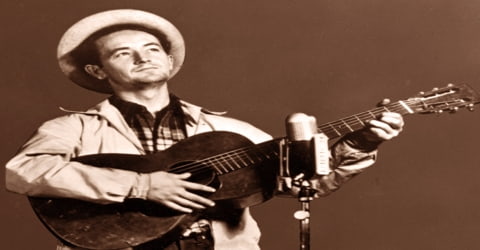
Woody Guthrie’s politics became increasingly leftist, and by the time he moved to New York City in 1940 he had become an important musical spokesman for labor and populist sentiments, embraced by left-leaning intellectuals and courted by communists. In New York, to which he had brought his family, Guthrie became one of the principal songwriters for the Almanac Singers, a group of activist performers including Leadbelly, Pete Seeger, Sonny Terry, Brownie McGhee, and Cisco Houston who used their music to attack fascism and support humanitarian and leftist causes.
Woody was hired by the Department of Interior in 1941 to write songs about the Columbia River and the construction of dams for the soundtrack of a documentary about the same. He wrote 26 songs for this project which included three of his highly popular songs ‘Roll on Columbia’, ‘Pastures of Plenty’ and ‘Grand Coulee Dam’.
In September 1940 Guthrie was invited by the Model Tobacco Company to host their radio program Pipe Smoking Time. Guthrie was paid $180 a week, an impressive salary in 1940. He was finally making enough money to send regular payments back to Mary. He also brought her and the children to New York, where the family lived briefly in an apartment on Central Park West. The reunion represented Woody’s desire to be a better father and husband. He said, “I have to set really hard to think of being a dad.” Guthrie quit after the seventh broadcast, claiming he had begun to feel the show was too restrictive when he was told what to sing. Disgruntled with New York, Guthrie packed up Mary and his children in a new car and headed west to California.
At the brink of America’s entry into World War II (1939–45; a war in which the Allies Great Britain, France, the Soviet Union, the United States from 1941, and others fought against the German-led Axis forces), Guthrie joined the Almanac Singers, a left-wing folk music group that included Pete Seeger, who eventually became a well-known member along with Guthrie. On February 14, 1942, the Almanacs gained their greatest exposure when they performed on a program called “This Is War,” which was aired by four major networks. Except, newspaper stories about the group’s Communist affiliations prevented the Almanacs from achieving commercial success. They dissolved within a year. Most of the members of the Almanacs were very anti-Nazi (German political party in rule during World War II that believed in the superiority of the white Aryan German race), and they enrolled in the U.S. military.
His songs had an authentic feel to them as Woody wrote of his own experiences of the difficult times during the Great Depression. He was also a writer in addition to being a musician. His partially fictionalized autobiography ‘Bound for Glory’ was released in 1943. The book was later adapted into a movie in 1976.
On August 29, 1942, Woody Guthrie performed “The Farmer-Labor Train”, with lyrics he had written to the tune of “Wabash Cannonball”. In 1948, he reworked the “Wabash Cannonball” melody as “The Wallace-Taylor Train” for the 1948 Progressive National Convention, which nominated former U.S. Vice President Henry A. Wallace for president. The Almanac Singers (of which Guthrie and Lampell were co-founders) appeared on The Treasury Hour and CBS Radio’s We the People. The latter was later produced as a television series). (Also, Marc Blitzstein’s papers show that Guthrie made some contributions to four CIO episodes (dated June 20, June 27, August 1, August 15, 1948) of Labor for Victory.) While Labor for Victory was a milestone in theory as a national platform, in practice it proved less so. Only 35 of 104 NBC affiliates carried the show. Episodes included the announcement that the show represented “twelve million organized men and women, united in the high resolve to rid the world of Fascism in 1942”.
Pete Seeger organized a folk-singing group called The Weavers in 1948, and for several years it produced one hit record after another. Though Guthrie was not a Weaver, their success helped his music. His “So Long, It’s Been Good to Know You” became one of their most popular numbers. But The Weavers were soon blacklisted (labeled as Communists and therefore not given any financial or professional support), and the fashion for popularized folk music disappeared with them.
During World War II, Woody Guthrie joined the U.S. Merchant Marine as a mess man and regularly sang for the crew in order to motivate and cheer them up. He was deemed ineligible for any further service in the Merchant Marine in 1945 and was drafted into the U.S. Army. After being discharged from the army he wrote and recorded ‘Songs to Grow on for Mother and Child’ (1947) which was a collection of songs meant for children.
In 1949, Guthrie’s music was used in the documentary film Columbia River, which explored government dams and hydroelectric projects on the river. Guthrie had been commissioned by the US Bonneville Power Administration in 1941 to write songs for the project, but it had been postponed by World War II. He suffered from Huntington’s disease and his health began deteriorating by the 1950s. He also had a campfire accident that injured his arm and left him unable to play guitar.
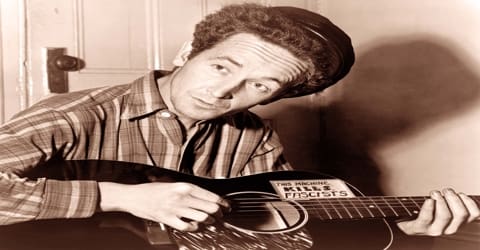
As the political tide in the United States turned conservative and then reactionary during the 1950s, Woody Guthrie and his folksinger friends in New York kept alive the flame of activist music making. He continued writing and performing politically charged songs that inspired the American folk revival of the 1960s, at the head of which were performers such as Bob Dylan, Joan Baez, and Phil Ochs, who came to pay homage to Guthrie in his hospital room in New Jersey, to which he was confined beginning in 1954, after his increasingly erratic actions were finally and correctly diagnosed as the result of Huntington disease. Among the more than 1,000 songs that Guthrie wrote were a number of remarkable children’s songs written in the language and from the perspective of childhood, as well as some of the most lasting and influential songs in the canon of American music, not least “So Long (It’s Been Good to Know Yuh),” “Hard Traveling,” “Blowing Down This Old Dusty Road,” “Union Maid,” and (inspired by John Steinbeck’s The Grapes of Wrath) “Tom Joad.” Probably the most famous of his works is “This Land Is Your Land,” which became a pillar of the civil rights movement of the 1960s.
Though a poor musician and an inconsistent performer, Guthrie wrote an estimated one thousand songs, which have earned him a secure place in musical history. When he was discovered, folk music had few fans except radicals (extremists) and a handful of admirers and musicologists (music researchers). Guthrie and The Weavers were responsible for folk music’s brief popularity in the late 1940s and early 1950s, and they influenced the greater following it developed ten years later. Though folk music became less popular, it continued to exist, and Guthrie’s legacy was very much a part of it. The year 2001 brought a revival of folk music mania after the release of O Brother, Where Art Thou? a movie set in the 1930s that was rich with folk and hill music.
Awards and Honor
Woody Guthrie was presented with the Conservation Service Awards in 1966 by the U.S. Department of the Interior.
Guthrie was given The North American Folk Alliance Lifetime Achievement Award posthumously in 1996.
Death and Legacy
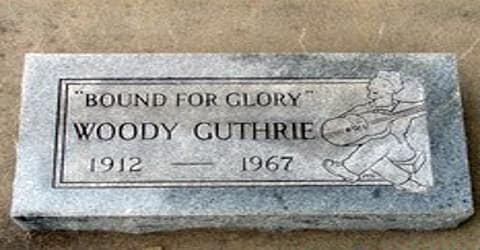
Woody Guthrie died of complications of Huntington’s disease on October 3, 1967. By the time of his death, his work had been discovered by a new audience, introduced to them through Dylan, Pete Seeger, Ramblin’ Jack Elliott, his ex-wife Marjorie and other new members of the folk revival, and his son Arlo.
At the time of his death in 1967, Guthrie had already begun to assume legendary stature as a folk figure, and his influence on such pivotal singer-songwriters as Bob Dylan and Bruce Springsteen was immense. A film version of his book Bound for Glory appeared in 1976, and in 1998 Billy Bragg and alternative rockers Wilco released the critically acclaimed Mermaid Avenue, a collection of previously unrecorded lyrics by Guthrie that they had set to music; Mermaid Avenue Vol. II followed in 2000.
The song ‘This Land Is Your land’ written by him in response to the patriotic song ‘God Bless America’ became one of the U.S.’s most popular folk songs. He believed that the lyrics of ‘God Bless America’ were too unrealistic and complacent and therefore felt the need to write a response to it. The song was added to the National Recording Registry in 2002.
Guthrie’s legendary influence on folk music is hard to assess. He was famous among leftists (those wishing for change and reform) in the 1940s, and by the 1960s, though hospitalized and unable to speak, he had become a heroic figure. Bob Dylan, before he himself became famous as the leading composer of political songs, made a pilgrimage (a journey to show respect) to Guthrie’s bedside. Guthrie’s reputation was based on his authentic folk origins and hobo inclinations, his remarkable talents as a writer and composer, and a romantic appreciation of his politics.
Information Source:
